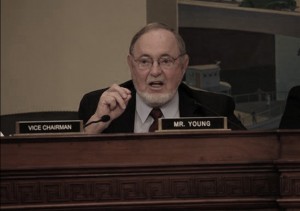
Washington, D.C. – A panel of Alaskan witnesses testified Tuesday before the House Natural Resources Subcommittee on Energy & Minerals Resources to discuss the future of Arctic offshore energy development and recent regulatory decisions by the Obama Administration that would significantly harm development in the region.
The oversight hearing, titled “Arctic Resources and American Competitiveness,” focused primarily on a package of Arctic rules proposed by the Department of Interior and the negative impact they would have on Alaska Natives, the State of Alaska, the Trans-Alaska Pipeline System, and to the nation’s goal of energy security and independence.
Alaska Congressman Don Young, a senior member of the House Natural Resources Committee, argued today that the Administration’s draft rules are overly prescriptive and lock oil and gas development into a status quo that diminishes the opportunity to carefully introduce and advance new technologies.
“I’ve read these proposed regulations and the problem I have is that the Administration is taking a ‘mother-may-I’ approach,” said Congressman Don Young. “ I don’t believe that will work…There are other technologies that should be used.”
Young later reminded his colleagues about the importance of listening to the people who live in the region, those with the most to lose from these decisions.
“I want my colleagues to know that he lives there,” Congressman Young said of Richard Glenn, who testified on behalf of the Arctic Slope Regional Corporation. “He doesn’t live in California or Virginia, or any other place. He lives there and understands the issues we face, and they are supporting [Arctic OCS development] .”

Testimony Tuesday included witnesses from Alaska representing regional, industry, and environmental interests, including representatives from the Arctic Slope Regional Corporation (ASRC) and Schlumberger-Alaska. Witnesses and Members of the Committee both expressed their concerns for the Administration’s rules and the strain they would have on development and innovation.
“Our communities cannot survive without continued resource development in our region,” Richard Glenn of ASRC. “We believe that the overly prescriptive nature of the Arctic Standards Rule is likely to hinder, rather than foster, development of oil and gas resources on the Arctic OCS.”
“These technologies are evolving with advances in primary barriers technology and well control methodologies. Current and future regulation must be flexible enough to incorporate these evolving advances,” said Christine Resler of Schlumberger – Alaska. “The absence of flexibility in the current regulations does not allow for technological advances and best practices to be incorporated to improve operational performance in a timely manner. The greatest potential for reducing environmental risk lies in the pursuit of superior well control and well integrity.”
“There seems to be a disconnect within this Administration when it comes to the development of these important resources,” said Subcommittee Chairman Doug Lamborn (R-CO). “On one hand we have a study conducted by the National Petroleum Council, requested by the Department of Energy, with extensive research and study into Arctic offshore energy development. On the other hand, we have an Arctic Rule published by the Department of the Interior that could significantly slow exploration and development and possibly curtail industry interest in future offshore lease sales that are currently scheduled.”
A study by the National Petroleum Council (NPC), a federally chartered body with more than 200 members appointed by the Secretary of the Department of Energy, recently concluded that offshore development can be done safely with current technology. Not surprisingly, the Department of Interior has failed to include NPS report findings into their regulatory policies.






